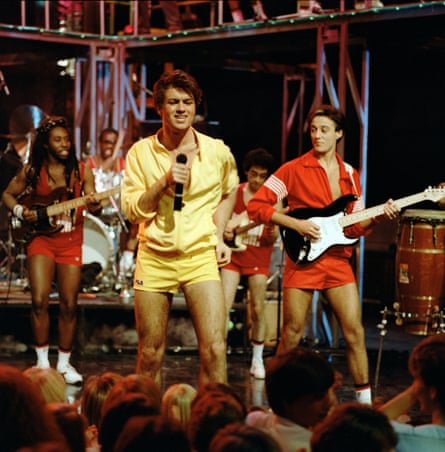In December 1984, two future seasonal staples were vying for Christmas No 1: Do They Know It’s Christmas? by charity supergroup Band Aid, and Last Christmas by Wham!. Admittedly, the competition wasn’t exactly cut-throat. George Michael not only sang on the Band Aid single, but also donated the royalties from Last Christmas to the same cause. Yet the Christmas single saturation that year did lead to a chart curiosity: Band Aid’s victory meant that one of the most beloved and brilliant festive songs never reached No 1.
The years, however, have only seen Last Christmas’s ubiquity grow: 3.7m copies sold and countless cover versions later (by everyone from Taylor Swift and Whigfield to Ariana Grande and Good Charlotte), it’s now the best-selling single to never reach the top of the UK charts. But this year, on the first anniversary of Michael’s death, with a fan campaign returning the song to the charts, that may be about to change.
There is something inherently mercenary about a Christmas song – a successful one can sustain a musician for a lifetime, and Wham!’s decision to create their own was unsurprising. Mark Ellen, who edited Smash Hits while the band were in their prime, remembers that many in the music press then “loathed Wham! and viewed them as vacuous heat-seekers, surfing the new booming economy”. But despite appearing like a sickly sweet and cynical chart commodity, in reality Last Christmas was practically a DIY production.
The song was recorded in August, 1984, at London’s once-fashionable Advision studios (by the time Wham! got there, its technology was rudimentary and dated). Earlier that year, Michael had wrested control of Wham! – and his burgeoning solo career – from a dodgy record contract. He had also started building himself up as a serious creative force from less-than-serious foundations.
The 21-year-old wrote, produced, performed and painstakingly played every single instrument on the track. Having gradually rid the recording process of interfering producers, managers, record company executives and even his bandmate Andrew Ridgeley, the only people admitted into the Last Christmas studio were Michael’s engineer, Chris Porter, and two assistants – not that they had much input. Porter remembers “desperately wanting to play sleigh bells”, but like everything else, they were jangled only by Michael himself.

Porter had begun working with the duo on their debut single Wham Rap! (Enjoy What You Do) – an odd, hip-hop-inspired track that celebrated life on the dole in a politically confusing way – and remembers the pair walking into the studio “literally in shorts”. “I thought these two just don’t stand a hope – they seemed so naive,” he says. It wasn’t long, however, before he started to notice Michael’s precocious self-possession. “He wasn’t afraid to go up against very experienced record businessmen,” says Porter. “He recognised the power of his creativity and the power that gave him in the business.”
The seed for Michael’s one-man production style was sown as he and Porter travelled back from recording sessions in the south of France for Wham!’s second album Make It Big. Booked into a studio in Paris, they found themselves recording Everything She Wants with no band and no producer. “I think this was when George started to realise that if he wanted to, he could do everything himself,” says Porter. “He could cut out all these other people and their ideas.”
Later, on Last Christmas, what had been accidental became deliberate. Accompanied only by a LinnDrum drum machine, a Roland Juno-60 synth and those Christmassy sleigh bells, Porter and Michael began recording a Christmas song in high summer, in a studio the assistant had adorned with paper chains and Christmas lights. But the process was more painstaking than heady. “George wasn’t a musician,” says Porter, “he had no training on instruments at all.” He nevertheless insisted on doing everything himself. “It was a laborious process, because he was literally playing the keyboards with two or three fingers,” he says.
Part of the reason for Last Christmas’s success is that it sounds like nothing and everything. The backing music is extremely simple, verging on the generic. “It’s one of those rare songs with the same tune and chords for the verse and chorus, and no middle-eight section, but with a strong enough melody to sustain it,” says Ellen. The music itself was deliberately nondescript, says Porter. “One of the really clever things about George was that he realised that he wanted the focus of the listener to be his voice and not musicianship. So the music’s often very stark. On Last Christmas, there is a very simple foundation for the vocal and the melody to sit on.”
Despite that simplicity, Michael was also striving to sound unique. Normally when artists are in the studio, says Porter, they use other musical references as touchstones – but despite a love of Motown and an audible debt to Chic, Michael never did that. Unfortunately, Last Christmas did resemble a number of other songs. It sounds remarkably like Kool & the Gang’s 1983 track Joanna, and Barry Manilow thought it was so similar to his 1978 hit Can’t Smile Without You, that he took Wham! to court. Porter says the case was thrown out when a musicologist presented 60-odd songs from the past century that had a comparable chord sequence and melody.

Lyrically, however, Last Christmas is far more distinctive: a hugely sophisticated song that teems with mixed signals and the potent illogic that defines the best pop. There’s a tension between the music and lyrics (“you’ve got the happiness of the rhythm track, but against that you’ve got the sadness of the unrequited love,” says Porter), but the real cleverness can be found in the words themselves. Not only does the nursery rhyme-style chorus take an acerbically bitchy turn (“This year to save me from tears, I’ll give it to someone special”), but also an inherently contradictory one – the narrator is trying to undermine his ex by dedicating an entire song to how crushed he is by their breakup.
But Last Christmas isn’t just about the lies we tell ourselves in order to cope with rejection – it’s also about the cognitive dissonance of obsessive love. At the end of the first verse, Michael pithily sets out this kind of doublethink: now he knows “what a fool I’ve been, but if you kissed me now, I know you’d fool me again”. It’s just one heart-rending epigram in a song full of them, capturing the way defiance masks hope, and how easily love and desire can delude us into forgiveness.
As a band, Wham! were Janus-faced, dealing half in ridiculously exuberant pop songs (Wake Me Up Before You Go-Go, Club Tropicana) and half in quietly devastated ballads. Nothing Looks the Same in the Light, from their debut album Fantastic, belongs firmly in the latter category, and seems to be Last Christmas’s most obvious predecessor. Yet a seam of shame – and an obsession with cold, noncommittal love – runs through many of their songs, irrespective of their BPM. Seemingly straightforward love song I’m Your Man, for example, is littered with references to wrongdoing and secrecy (“Baby, your friends do not need to know!”).
In hindsight, it’s easy to read the undercurrent of transgression and rejection in Wham!’s back catalogue as a reference to Michael’s then-closeted homosexuality. However conscious this was, Last Christmas’s video certainly brings home the idea of Michael living parallel lives – the public one and the twilight one with the lovers who leave at daybreak – as the scene of a jolly Christmas holiday is overlaid with wistful memories about past romance. Wham!’s manager at the time, Simon Napier-Bell, says the song was always envisaged by Michael as part of a “Christmas package”, alongside a “snowy video and Wham! playing Wembley at Christmas Eve – all a huge Wham! Christmas party”. Despite that ambition, the shoot was only organised at the last minute. Director Andrew Morahan, who was given the brief by Michael to create a “Christmas-themed version of Club Tropicana”, was sent around Europe to scout for “premier neige”, as he puts it.
Eventually, in late November, the band, plus friends and family members (including backing singers Pepsi and Shirlie, and the latter’s boyfriend, Martin Kemp) were flown out to a Swiss resort called Saas-Fee, along with a model, Kathy Hill, who plays the frosty ex-girlfriend. Hill remembers the filming as boozy and very relaxed: “I wouldn’t normally drink on a shoot, but during that scene at the dinner table it was all getting a bit silly.” Despite playing the “bitch”, Hill bonded with Michael on the shoot. “I was dating the composer Vangelis at the time and George was so interested in his music, so he kept asking me about that,” she recalls, as well as recounting how Michael made her laugh constantly. “He had an amazing sense of humour. There’s a scene when we’re walking up the hill and every time we went up he just fell down, so every time I burst into laughter. That shot where we’re rolling around and he ends up sitting on me, I’m genuinely laughing my head off. It was great.”
Yet, like his domination of the recording process, there was also the sense that Michael was taking things increasingly seriously. Hill noticed that he didn’t drink as much as the rest of the group and frequently left the frivolities to check shots. This was at a time when Wham!’s demise was on the horizon, and Michael was beginning to plan his solo career.
Last Christmas was written by Michael in his childhood bedroom (“the room in which we had spent hours as kids recording pastiches of radio shows and jingles”, as Andrew Ridgeley recently recounted), while his bandmate was downstairs watching television. Apart from geographical proximity, Ridgeley had little to do with the song itself – yet he was still a key part of the Wham! brand. For the band’s Christmas Eve show at Wembley, they dressed up as Father Christmases, classic Wham! shtick that fitted more with Ridgeley’s personality than Michael’s. “Without Andrew, I don’t think George would have had the confidence to do what he did,” says Porter. “Andrew didn’t have any fear – he wasn’t nervous about going on Top of the Pops, making a fool of himself, dressing up, learning dance routines.”
Even during Wham!’s heyday, Michael remained uncomfortable with the trappings of pop star life, especially being on camera. The Last Christmas video saw his insecurities flare again. After the shoot, Hill remembers speaking to Wham!’s other manager, Jazz Summers, who was worried “people wouldn’t know what was going on” after Michael “made Jazz cut so many scenes out because he was so adamant that there were certain angles that he didn’t like on his face”.
Straight after the shoot finished, Michael headed to the recording of Do They Know It’s Christmas?, joining 80s pop stars such as Sting, Tony Hadley, Bono, Boy George and Phil Collins. It would keep his own offering off the No 1 spot, but the charts that year could not predict Last Christmas’s bright future – one that has seen it become a treasured, complex Christmas classic in a way that the Band Aid single, for all its star power and media frenzy, never quite managed.

Comments (…)
Sign in or create your Guardian account to join the discussion